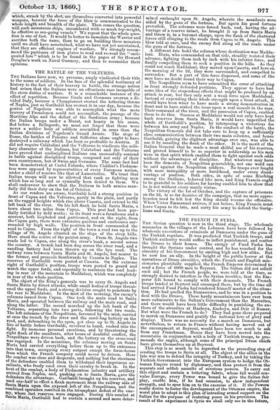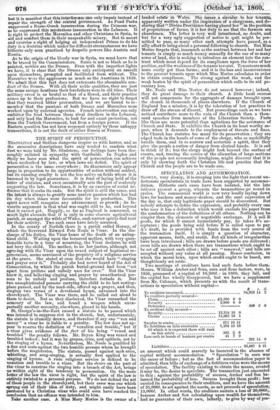THE FRENCH IN SYRIA.
THE Syrian question is now in the third stage. The wholesale massacres in the villages of the Lebanon have been followed by wholesale executions of criminals at Damascus under the guns of the Turkish regulars. It was predicted that Turkish troops, and Turkish authority would suffice to inflict punishment, and scatter the Druses to their homes. The energy of Fund Pasha has brought the Syrians under control, and he has vouched for the sincerity of his Government by smiting high and low alike. But he now has an ally. In the height of the public horror at the narratives of Druse atrocities, which the French and English mis- sionaries plentifully supplied, the French Emperor determined to send a force of 6000 men to Beyrout. The Sultan did not solicit such aid ; but the French people, we were told at the time so strongly desired to interfere in the Syrian troubles, that the Em- peror felt bound to comply with their demands. The French troops landed at Beyrout and encamped there, but by the time all had arrived Fuad Pasha had rendered himself master of the situa- tion. He had quelled the Damascenes, and he was in a position to deal with the Druses, These hardy mountaineers have ever been more submissive to the Sultan's Government than the Maronites, and there would have been little difficulty in punishing the au- thors of the atrocities at Hasbeya, Itasheya, and Deir el Kaman But what were the French to do ? They had gone there prepared to march on Damascus and gratify the national love of glory and display. There was no necessity for a march on Damascus, but nevertheless, to return to France without having moved out of the encampment at Beyrout, would have been too much to ask from any Frenchman. Hence they have been moved into the mountains in conjunction with a body of Turkish troops, to pro- menade the eagles although sonic of the principal Druse chiefs have given themselves up at Beyrout. This step is as much to be regretted as the preceding step of sending the troops to Syria at all. The object of the allies in the late war was to defend the integrity of Turkey, and by taking the Turkish Government into the European system to hedge the Ot- toman Empire round by diplomacy, and thus protect it from the separate and selfish assaults of covetous powers. To carry out this object and sustain a tottering fabric whose fall would con- vulse Europe, every Power was bound to give the Sultan fair play, enable him, if he had occasion to show independent .1 strength, and to spur him on to the exercise of it. If the Powers really desire to foster the development of the Ottoman empire, the worst plan to adopt is this plan of intruding armed support on the Sultan for the purpose of restoring peace in his provinces. The result of the experiment in Syria we shall only see in the future,
but it is manifest that this interferesee can only impair instead of repair the strength of the central government. As Fuad Pasha suppressed a Russo-Greek insurrection during the Crimean war, so he suppressed this mysterious insurrection in the Lebanon. It is right to protect the Maronites and other Christians in Syria, to aid and comfort them in their unspeakable misery. But to assert and exercise a right of helping an independent Prince to do his duty is a doctrine which under far different circumstances we have hitherto only seen practised by despotic powers like Austria and Russia.
As to the origin of the bloody war in Syria, we must leave that to be traced by the Commissioners. Satan is not so black as he is painted, neither are the Druses. Even with the imperfect lights we have, it is clear that the Draws only anticipated an assault upon themselves, prompted and facilitated from without. The Maronites were the aggressors as much as the Austrians in 1859. We admit that this fact does not extenuate the abominable con- duct of the Druses. With all their noble qualities, they are just the same savage heathens their forefathers were in old time. Their military creed is as brutal as that of a Herod, and their practice comes up to their professions. But we have no right to forget that they received bitter provocation, and we are bound to re- member that the passions of both Druses and Maronites were worked upon by external agencies. French intervention can only embitter the feud between these rival dwellers in the Lebanon, and only lead the Maronites, to look for and exact protection, not from the Turkish Government, but from a foreign power. If the Eastern question has not been reopened entirely by these unhappy transactions, it is not the fault of either Russia or France.



























 Previous page
Previous page